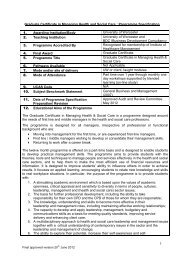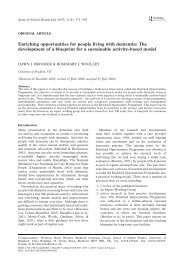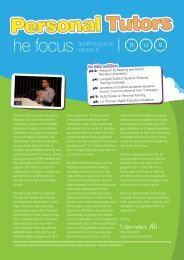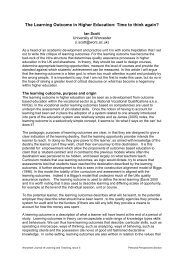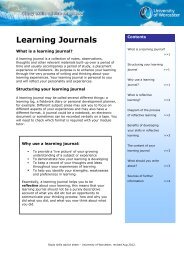Mentoring and Coaching stories - University of Worcester
Mentoring and Coaching stories - University of Worcester
Mentoring and Coaching stories - University of Worcester
You also want an ePaper? Increase the reach of your titles
YUMPU automatically turns print PDFs into web optimized ePapers that Google loves.
the outcomes <strong>of</strong> the conversations. I have concluded that informal practices are neither equalnor greater to formal practices, but instead are different <strong>and</strong> as such play a valuable role withinthe formal pr<strong>of</strong>essional, reflective practices that are part <strong>of</strong> the trainees’ development. However,it seemed to me, an important aspect <strong>of</strong> mentoring is found in Whitmore’s claim that it is asmuch about the way these things are done as about what is done (Whitmore, 2001 p.6).The informal coaching <strong>and</strong> mentoring skills or techniques used by tutors role were relevant here<strong>and</strong> could range, according to Thomas <strong>and</strong> Smith’s perspective from directive to non-directive(2006, p.27). The unpredictable nature <strong>of</strong> the contents <strong>of</strong> an informal mentoring encounter addsa layer <strong>of</strong> complexity <strong>and</strong> requires great expertise on the part <strong>of</strong> tutors, when approached with aquick question. In a relatively short space <strong>of</strong> time the skill <strong>of</strong> switching <strong>and</strong> interweaving differentcoaching <strong>and</strong> mentoring techniques is required.<strong>Coaching</strong> - <strong>Mentoring</strong> <strong>and</strong> the GTP tutor: how far can I go?Heather Crabtree – Senior LecturerAs a GTP tutor I had previously encountered some difficulties in finding the best way to workwith some singularly dem<strong>and</strong>ing trainees so I was keen to adopt a different approach to mytutorial work. I wanted to explore whether if were more skilled in the art <strong>of</strong> coaching-mentoringthe time spent in tutorials could be more beneficial to the trainees.The scope <strong>of</strong> my research was very small <strong>and</strong> focused on critical reflections on my ownpractice. In order to identify the elements <strong>of</strong> mentoring-coaching, with the trainee’s permission, Irecorded two consecutive one-hour tutorials which occurred at the beginning <strong>and</strong> end <strong>of</strong> myinput sessions on the <strong>Coaching</strong> <strong>and</strong> <strong>Mentoring</strong> module.Part <strong>of</strong> my own ethical dilemma was the extent to which my carrying out this piece <strong>of</strong> researchwould impact on the level <strong>of</strong> support that I was able to <strong>of</strong>fer the trainee. Could participating inthis actually have a negative impact on him <strong>and</strong> hold him back? If my skills <strong>of</strong> coaching <strong>and</strong>mentoring were lacking then he may receive less support during tutorials than he otherwisewould have done. I was also struggling with my own concern, aware that I was considered byhim as the “expert”, what if by withholding useful advice I was actually making the course moredifficult for him? A leap <strong>of</strong> faith was needed that required me to be convinced that allowing thestudent to work out the solution for themselves (Malderez <strong>and</strong> Wedell 2007:126) would providea positive outcome.Analysis <strong>of</strong> the data coupled with emails <strong>and</strong> pr<strong>of</strong>essional conversations we subsequently hadleads me to conclude that this particular concern was unfounded as the trainee showed a goodlevel <strong>of</strong> reflection throughout the tutorials <strong>and</strong> more importantly appeared to feel empowered bythe outcomes <strong>of</strong> each tutorial.“…. Oh, that was great, I feel a lot better now”. (comment at the end <strong>of</strong> the secondtutorial)It became apparent that the nature <strong>of</strong> the questions I was asking required him to thinkcarefullyabout his own way <strong>of</strong> thinking <strong>and</strong> working:“That’s an interesting one! I’ll have a think about that.”“I think I have to! I’d not thought <strong>of</strong> it in that way”.However, a closer analysis <strong>of</strong> the conversations shows that these comments derived frommoments where as the mentor-coach, I veered more towards the directive <strong>and</strong> was <strong>of</strong>fering<strong>Worcester</strong> Journal <strong>of</strong> Learning <strong>and</strong> Teaching, Issue 6Articles Section




